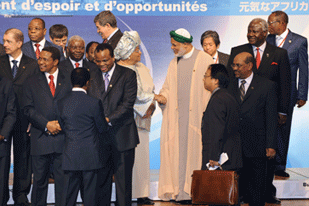 Stark contrasts abound with development minded, economic powerhouse Japan invites Africa's leaders with abundant resources to sit down and chat at the Fourth Tokyo International Conference on African Development (TICAD IV). Actually, the conference is really in the suburb Yokohama in the Minato Mirai 21 district and is only the fourth since 1993. Japan, a closed society, yet first world nation needs to procure resources. The African continent is replete with all manner of resources. Dictators and some well meaning naive African leaders have in the past too quickly signed away mineral rights, water distribution and natural resource development to China and other nation states with positive cash flows, leading to trade inequities. Japan needs to get in line as the price of oil soars or remains unstable. Japan needs more oil and a stream of resources to continue fueling the economy at its current rate. Japan is facing its own debt challenges which have rocked the government in recent months. Hence, Prime Minister Yasuo Fukuda extends the hand of friendship and a basket of aid to counterparts in Africa.
Stark contrasts abound with development minded, economic powerhouse Japan invites Africa's leaders with abundant resources to sit down and chat at the Fourth Tokyo International Conference on African Development (TICAD IV). Actually, the conference is really in the suburb Yokohama in the Minato Mirai 21 district and is only the fourth since 1993. Japan, a closed society, yet first world nation needs to procure resources. The African continent is replete with all manner of resources. Dictators and some well meaning naive African leaders have in the past too quickly signed away mineral rights, water distribution and natural resource development to China and other nation states with positive cash flows, leading to trade inequities. Japan needs to get in line as the price of oil soars or remains unstable. Japan needs more oil and a stream of resources to continue fueling the economy at its current rate. Japan is facing its own debt challenges which have rocked the government in recent months. Hence, Prime Minister Yasuo Fukuda extends the hand of friendship and a basket of aid to counterparts in Africa.Under the theme "Toward a Vibrant Africa: A Continent of Hope and Opportunity", the meeting is to focus on boosting economic growth, ensuring human security and addressing environment and climate change issues in Africa.Asia-Africa cooperation, intra-Africa cooperation and public-private partnership are important for the development of the nations. The meeting will serve as a platform for broadening the development partnership.
Japanese Foreign Minister Masahiko Koumura said prior to the meeting that the conference was expected to adopt the "Yokohama Declaration" outlining guiding principles and approaches to African development among the TICAD stakeholders, as well as the "Yokohama Action Plan and the Yokohama Follow-up Mechanism" laying out a road map for action-oriented initiatives with measurable targets.
 Japan, at one point in history, has depicted all manner of black folks, among others not ethnically Japanese, with the worst connotations based on race as fully noted by the UN in a 2005 report. Japan now needs Africa's abundant resources to maintain its current quality of life. Africa's leaders, plagued by a surfeit of government workers on the take/dole/corruption path, underscores a desperate need to engineer a means of making money rather than spending it on government to build sustainable economies. All of which, in either case, affect the environment.
Japan, at one point in history, has depicted all manner of black folks, among others not ethnically Japanese, with the worst connotations based on race as fully noted by the UN in a 2005 report. Japan now needs Africa's abundant resources to maintain its current quality of life. Africa's leaders, plagued by a surfeit of government workers on the take/dole/corruption path, underscores a desperate need to engineer a means of making money rather than spending it on government to build sustainable economies. All of which, in either case, affect the environment.In a few weeks, Japan will host the Great 8 summit in July after a failure this weekend to get those self same countries off the dime to announce a global environmental package. Geopolitical discussions are on the table as Japan seeks more direct influence at the UN. Tanzania, Uganda, South Africa, Liberia, Ethiopia, Angola are among the countries with 39 African heads of state attending the conference. Japan is putting staggering amounts of yen on the table in loan and grants in exchange for development rights which is right in keeping with what the World Bank endorses. The enormous amount of debt each nation is racking up in these deals needs careful consideration. Longtime Africa Champion, by way of Ireland and the south of France, Bono, is ecstatic to see the aid promises, but wants decidedly more done for Africa, especially on the food and agricultural fronts.
Tanzanian President Jakaya Kikwete noted that only about two percent of Japanese imports were from Africa.
"Mr. Prime Minister (Fukuda), this must change. What remains to be seen is increased trade and investment, and more development of the Japanese private sector on the African continent," he said.
Foreign Minister Simbarashe Mumbengegwi of Zimbabwe, which faces intense international criticism, charged that foreign aid policies were slanted to serve political ends.
"The structure of lopsided power distribution in the United Nations system, particularly in the Security Council, is replicated in the development institutions such as the World Bank and the International Monetary Fund," Mumbengegwi said.
 Much remain to be done as the value of goods to be traded will be a contentious topic. From Paul Collier comes a book that rips open how the world manages to keep a billion people from the bottom rung of the economic ladder from Asia to Africa. The Bottom Billion: Why the Poorest Countries are Failing and What Can Be Done About It springs from a life time of analysis from a former personage at the World Bank. Staving off a humanitarian crisis is not for the faint of heart and this book chronicles 50 failed states, especially those that sold their natural resources on get rich quick schemes.
Much remain to be done as the value of goods to be traded will be a contentious topic. From Paul Collier comes a book that rips open how the world manages to keep a billion people from the bottom rung of the economic ladder from Asia to Africa. The Bottom Billion: Why the Poorest Countries are Failing and What Can Be Done About It springs from a life time of analysis from a former personage at the World Bank. Staving off a humanitarian crisis is not for the faint of heart and this book chronicles 50 failed states, especially those that sold their natural resources on get rich quick schemes.










No comments:
Post a Comment